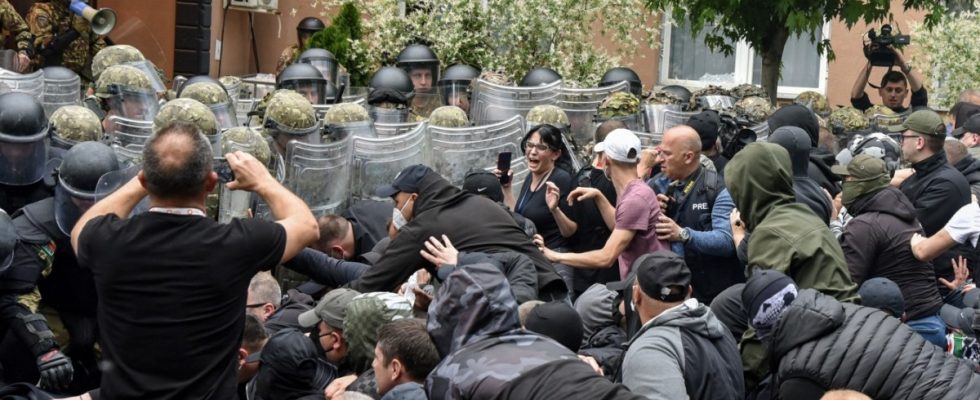Dozens of NATO peacekeeping troops have apparently been injured in violent protests by ethnic Serbs after the local elections in Kosovo. The soldiers deployed to protect town halls were attacked from crowds with exploding incendiary devices on Monday, NATO’s Kosovo Force (KFOR) announced. Soldiers from Italy and Hungary suffered broken bones and burns in the village of Zvečan. There, around 300 KFOR soldiers in battle gear had taken up positions in front of the municipal office.
The exact number of injured is unclear. While NATO speaks of around two dozen, the Italian Ministry of Defense reported 14 Italians injured. The Budapest news portal hvg.hu wrote, citing diplomatic circles, that 20 Hungarian soldiers were injured.
According to eyewitnesses, the police, made up of ethnic Albanians, used tear gas against the protests. Serbian state television reported that two Serbs were also injured.
NATO strongly condemned the attacks on KFOR troops. “Such attacks are totally unacceptable. The violence must stop immediately. We call on all sides to refrain from actions that further fuel tensions and to engage in dialogue,” said a spokeswoman for the military alliance. KFOR troops would take any action necessary to maintain a secure environment.
Italy’s Prime Minister Giorgia Meloni also condemned the attack. “What is happening here is absolutely unacceptable and irresponsible. We will not tolerate any further attacks on the KFOR,” she said, according to a statement.
EU foreign policy chief Josep Borrell also condemned the clashes. On Twitter he called for an immediate dialogue and wrote: “The EU calls on the authorities of Kosovo and the demonstrators to de-escalate the situation immediately and unconditionally.”
Meanwhile, neighboring Serbia has put its armed forces on full combat readiness, Defense Minister Miloš Vučević said. Serbian President Aleksandar Vučić had already ordered combat readiness on Friday, albeit initially at a lower level. Vučić’s office announced that he would meet on Tuesday with the ambassadors of the United States, Italy, France, Germany and Great Britain – the so-called Quint Group. After that he will hold separate meetings with the ambassadors of Finland, Russia and China.
The background to the recently flared up conflict between the Serbian minority and the Albanian majority in Kosovo are the local elections on April 23. The Serbs, who make up the majority of the population in the northern part of the country, boycotted the elections. As a result, Albanian mayoral candidates also won in Serb-majority communities.
Ethnic Serbs gathered for demonstrations when they took office on Monday. Ethnic Serbs had already withdrawn from the police and other public offices last year in protest against the policies of the Albanian population group.
Kosovo declared its independence from Serbia in 2008. However, this is not recognized by Serbia or by the Serb population in Kosovo. KFOR, sent by NATO, has been tasked with ensuring security in the country since 1999 on the basis of a UN mandate.

